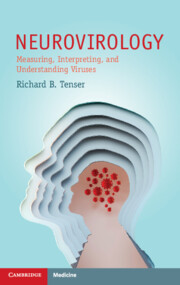Book contents
- Neurovirology
- Neurovirology
- Copyright page
- Dedication
- Contents
- Preface
- 1 Introduction to Virology
- 2 Measurement of Infectious Virus
- 3 Molecular Biology
- 4 The Immune System
- 5 Viral Pathogenesis
- 6 Viral Infections of the Nervous System
- 7 Neurovirology and Immunology
- 8 Experimental Neurovirology
- 9 The Future
- References
- Index
- References
2 - Measurement of Infectious Virus
Published online by Cambridge University Press: 13 July 2023
- Neurovirology
- Neurovirology
- Copyright page
- Dedication
- Contents
- Preface
- 1 Introduction to Virology
- 2 Measurement of Infectious Virus
- 3 Molecular Biology
- 4 The Immune System
- 5 Viral Pathogenesis
- 6 Viral Infections of the Nervous System
- 7 Neurovirology and Immunology
- 8 Experimental Neurovirology
- 9 The Future
- References
- Index
- References
Summary
While there are many methods to measure viruses, there are few to measure infectious virus. One of the best is the viral plaque assay, performed on living cells in cell culture plates. The premise of the assay is that each infectious virus particle (not all virus particles are infectious) will infect one cell, will replicate in that cell and will spread to other adjacent cells. The read-out of the assay is plaque-forming units (PFUs), where each indicates an infectious virus particle.
Modification of the plaque assay may be performed to measure neutralizing antibody. There are many methods to measure antibody to viruses, but few to measure neutralizing antibody. In this assay, a known amount of virus (a known number of PFUs) is incubated with the specimen (for example, human serum) to be tested for neutralizing antibody. Decrease in the PFUs seen indicates the degree to which the serum blocked (neutralized) the virus from infecting cells.
- Type
- Chapter
- Information
- NeurovirologyMeasuring, Interpreting, and Understanding Viruses, pp. 34 - 44Publisher: Cambridge University PressPrint publication year: 2023

